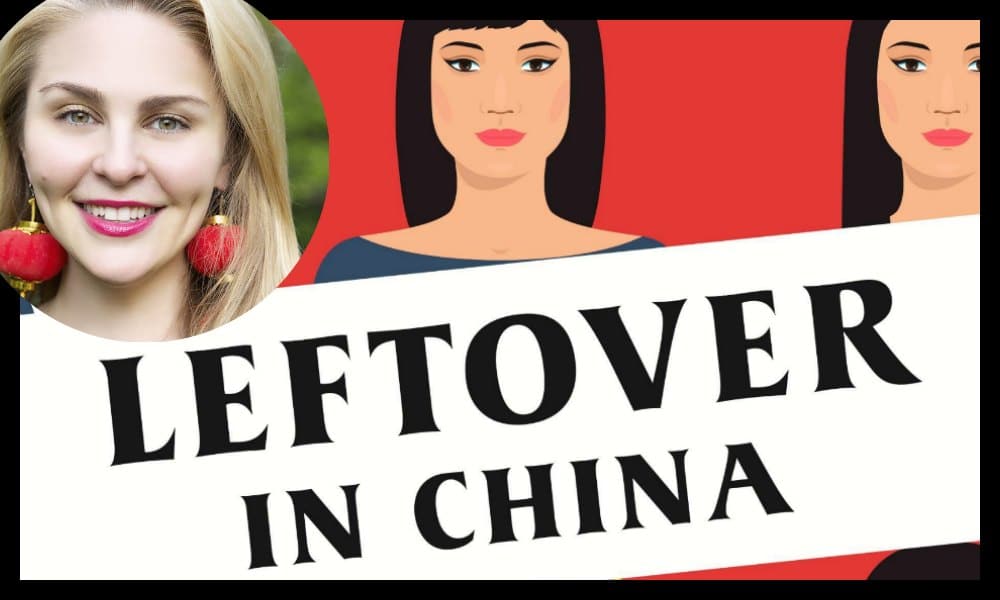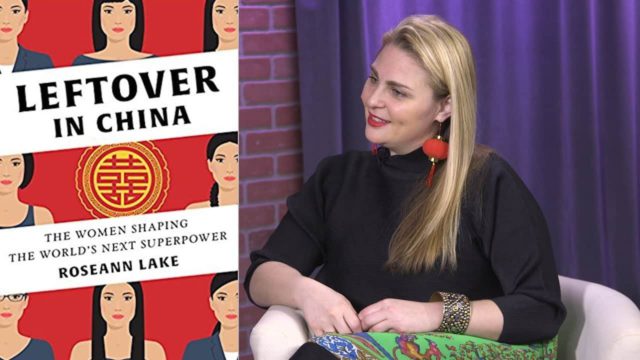China Books & Literature
Leftover in China: The Women Shaping the World’s Next Superpower by Roseann Lake
In a new book on China’s Leftover Women, author Roseann Lakes highlights the strength and merit of China’s unmarried women.
Published
6 years agoon

With Leftover in China – The Women Shaping the World’s Next Superpower, author Roseann Lake brings a deeply insightful and captivating account of China’s so-called ‘leftover women’ – the unmarried females who are shaping the future of the PRC. A must-read book for this Spring Festival holiday.
As the count-down for China’s most important event of the year, the Spring Festival, has started, countless unmarried daughters and sons anticipate the reunion with their parents and relatives with some horror. “Why are you still single?” is amongst the top-dreaded questions they are facing during the New Year’s dinners at the family dining table.
More so than the bachelor sons, it’s China’s unmarried daughters in their late twenties and early thirties who came to be at the center of a media storm over the past decade. The so-called ‘leftover women’ (剩女 shèngnǚ) have become a source of critique, banter, worry, fascination, and inspiration for the media, both in- and outside China.
The term shèngnǚ became a catchphrase ever since the Chinese Ministry of Education listed it as one of the newest additions to Chinese vocabulary in 2007. The shengnü label is mainly applied to unmarried (urban) women in their late twenties or early thirties who are generally well-educated and goal-oriented, but who came to be associated with ‘leftover food’ because of their single status and long-standing beliefs about the right age to marry.
One 2015 survey by Chinese dating site Zhenai, that was held amongst 1452 single men and women, shows that 50% of Chinese men think that women who are still single at the age of 25 are ‘leftovers.’
SILVER LININGS
“I’m pro-active about finding a partner, but not to the extent that it gets in the way of other ambitions.”
After the success of much-acclaimed books such as Factory Girls (Leslie T. Chang 2008) and Leftover Women: The Resurgence of Gender Inequality in China
(Leta Hong Fincher 2014), Leftover in China: The Women Shaping the World’s Next Superpower (2018) by Roseann Lake, Cuba correspondent for The Economist, brings fresh insights into the role and position of young women in a rapidly-changing society.
At the root of the ‘leftover women’ phenomenon and the media frenzy around it lies China’s One-Child Policy (1979-2015), the country’s imbalanced sex ratio, and traditional perceptions on wives and mothers being the building blocks of Chinese families and the nation at large.

Leftover in China is Roseann’s Lake first (non-fiction) book.
Lake describes how the onset of China’s One-Child Policy and a traditional preference for sons, together with the available ultrasound technology in the late 1980s, led to an enormous rise of abortions on female fetuses. The gender imbalance it brought about is most severe in China’s rural areas; in places such as Tianmen, Hubei, the gender ratio is a shocking 176 males to 100 females. It leaves villages full of men who are unable to find a bride and start a family. Guānggùn (光棍), they’re also called, literally the “bare branches” of their hometowns.
While the ‘bare branches’ reside in China’s more rural areas, the ‘leftover women’ live in China’s more urban areas. The ‘bare branches’ and ‘leftover women’ both have difficulties in finding a partner, albeit for radically different reasons. For the rural men, there simply are not enough marriage candidates, whereas for the urban women, there are not enough suitable marriage candidates. A major difference between the countryside and the urban environment is that China’s cities have seen a much better-balanced gender ratio, with parents pampering and pressuring their only child – whether it was a boy or girl.
Although Lake does explain the “gruesome cloud” of China’s One-Child Policy and female foeticide and the demographic problems it has triggered, she especially focuses on the “silver lining,” which is that the sociopolitical circumstances have also ‘forced’ parents to value their daughters more than ever before. Over the past decades, millions of Chinese daughters have been given the opportunities and liberties their mothers and grandmothers never had. Their increased educational and professional prospects have made marriage somewhat less of a priority for them.
While China’s unmarried, urban woman are often stigmatized by Chinese state media for being too ‘spoilt’, ‘picky’, or ‘promiscuous’ to marry, Roseann Lake casts an entirely different light on China’s urban bachelorettes as being determined, independent, and self-assured. “I’m pro-active about finding a partner,” one of the ‘leftover women’ in Lake’s book says: “But not to the extent that it gets in the way of other ambitions.”
CHANGING TIMES, CHANGING LOVE
“Leftover women are resisting ultimatums to wed because they want to marry for love, and not just for the sake of being married.”
Lake’s strong connection to Chinese culture and society jumps off the pages of Leftover in China, in which she playfully and compellingly offers a window into the female experience in modern China, explaining fascinating concepts that are unique to modern-day society. One such example is the ‘phantom third stories’ phenomenon; two-story houses with an unfinished ‘fake’ third story, built by unmarried men and their family to make the house appear more grandiose in the hopes of attracting a wife.
The interest in China started when Lake took a sabbatical from her job with the French government in New York, and went to Beijing. “I was only supposed to stay for three months,” she tells What’s on Weibo: “But shortly into my stay I bought a hot orange electric – Chinese – ‘Vespa’, and that changed everything.”

Journalist Roseann Lake.
As Lake was riding her scooter, which she lovingly nicknamed ‘Fanta’, she took in the city and all of its aspects, including its love and romantic relationships. On what first caught her attention within this field, she explains that it started one afternoon as she was riding her scooter in Beijing and spotted a very angry Chinese woman on the side of the road, screaming profanities at a man who appeared to be her romantic partner. The altercation turned violent, and it was not the first time Lake had witnessed such a scene between couples in public.
“I felt that something seemed afoul with the state of romantic relationships in China,” she says – which was a start of her interest and research into romance, love, and the role of Chinese women in this. “For thousands of years, marriage has largely been a mercenary, transactional agreement in China, made with the best interests of the key stakeholders – the parents – in mind.”
Romantic love as a reason for marriage in China, Lake says, is a relatively new concept. She tells What’s on Weibo: “Down the line, this better helped me understand the situation of leftover women – many of which, as I discovered, were resisting ultimatums to wed because they wanted to marry for love, and not just for the sake of being married.”
The topic of China’s changing marriage values and the generation gap in perceptions on love and marriage between parents and their daughters recurringly comes back in Lake’s book, for which she followed the lives of various ‘leftover women’ over a period of several years. Through the stories of women such as Christy, the CEO of a successful Beijing PR firm, or June, a “return turtle” who came back to the mainland after graduating from Yale, readers can get a grasp of the pressures and problems many single women are facing in China today.
An important lesson to draw from this book is that the phenomenon of China’s ‘leftover women’ cannot be explained through a unidimensional lens. Lake highlights China’s historical, societal, cultural, and economic dimensions in her approach of why this large group of unmarried women, despite all of their personal, academic and professional achievements, are still being labeled through their single status.
THE TOAST OF THE NATION
“There is irony and absurdity in the fact that these women are referred to as “leftover” but are really such an important part of China’s future.”
In 2016, an ad campaign by skincare brand SK-II titled ‘She Finally Goes to the Marriage Corner’ (她最后去了相亲角) gained huge popularity on Chinese social media. The short video showed how women, pressured to get married by their families and society, pluck up the courage to speak out and get their message heard.
The video received much praise, with many women protesting against the derogatory ‘leftover women’ label. CCTV recently also posted a feature article on social media in which various women plead for the elimination of the “leftover woman” or shèngnǚ label.
Why, then, would Lake still refer to the ‘leftover’ label on the cover of her book? About the book’s title, Lake says: “There was a different title that I preferred, but my publisher disagreed with it, so we compromised on ‘Leftover in China.’ It has grown on me. I’m told that for non-fiction books, the subtitle is just as important as the title itself, and I think “The Women Shaping the World’s Next Superpower” is apt. It underscores the irony and absurdity of the fact that these women are referred to as “leftover” but are really such an important part of China’s future.”
Throughout the course of writing this book, Lake spoke to many experts on the importance of China’s young (unmarried) women in shaping Chinese economics. One of them is Dr. Kaiping Peng, the founding chair of the Department of Psychology at Tsinghua University, who is quoted as saying: “The Chinese economic miracle has two secrets. The first are migrant workers, and the second are young, educated women.”
All the love, time, and money that Chinese parents and grandparents have invested in their only (grand)daughter has now paid off – not just for them, but for the economy at large. These well-educated and hard-working women play a powerful role in running China’s economic engine.
THE FUTURE OF CHINA’S LEFTOVER WOMEN
“Few people know that the most imbalanced year for sex ratio at birth in China was actually 2005.”
When talking about the future of China’s ‘leftover women,’ Lake suspects that they will continue to get married later in life or not at all – on trend with what is also happening in countries such as Japan or South Korea. “This would be much to the dismay of the Chinese government” Lake says, “- which desperately wants babies, but hasn’t done much to incentivize or make it easier for women to have them.”
Social media platforms such as Weibo and WeChat also play an important role in the lives of these women: “When I was living in China and writing the first drafts of this book, there were a few groups on Weixin [WeChat] where women would chat, share articles, and plan gatherings. They’ve dramatically multiplied! More content is shared, more ideas are exchanged, and the ease of these platforms means that Chinese women abroad can easily remain a part of the conversation.”
Lake is more worried about the so-called guānggùn, China’s ‘bare branches’: “We all may imagine that the worst years for gendercide were in the 80s and 90s, when population controls were stricter in China, but I think few people know that the most imbalanced year for sex ratio at birth in China was actually 2005. That means that boys who are now 13 years old will likely have a harder time finding a wife than any generations of men before them.”
This Spring Festival, Lake is anticipating the launch of her book (release February 13, 2018), which has already been listed as one of the must-read books for 2018 by the South China Morning Post.
For China’s many bachelorettes, they’ll just have to face the nagging questions at the New Year’s dining table, but they need not worry too much about being called ‘leftover women.’ Through books such as these, the term loses its derogatory tone – it is becoming a badge of honor instead.
Leftover in China: The Women Shaping the World’s Next Superpower by Roseann Lake is now available for pre-sale:
Get on Amazon: Leftover in China: The Women Shaping the World’s Next Superpower
Get on iTunes: Leftover in China: The Women Shaping the World’s Next Superpower
Get on Book Depository: Leftover in China: The Women Shaping the World’s Next Superpower
By Manya Koetse
Follow @whatsonweibo
Spotted a mistake or want to add something? Please let us know in comments below or email us.
©2018 Whatsonweibo. All rights reserved. Do not reproduce our content without permission – you can contact us at info@whatsonweibo.com.
Manya Koetse is the founder and editor-in-chief of whatsonweibo.com. She is a writer, public speaker, and researcher (Sinologist, MPhil) on social trends, digital developments, and new media in an ever-changing China, with a focus on Chinese society, pop culture, and gender issues. She shares her love for hotpot on hotpotambassador.com. Contact at manya@whatsonweibo.com, or follow on Twitter.

China Books & Literature
Why Chinese Publishers Are Boycotting the 618 Shopping Festival
Bookworms love to get a good deal on books, but when the deals are too good, it can actually harm the publishing industry.
Published
2 months agoon
June 8, 2024By
Ruixin Zhang
JD.com’s 618 shopping festival is driving down book prices to such an extent that it has prompted a boycott by Chinese publishers, who are concerned about the financial sustainability of their industry.
When June begins, promotional campaigns for China’s 618 Online Shopping Festival suddenly appear everywhere—it’s hard to ignore.
The 618 Festival is a product of China’s booming e-commerce culture. Taking place annually on June 18th, it is China’s largest mid-year shopping carnival. While Alibaba’s “Singles’ Day” shopping festival has been taking place on November 11th since 2009, the 618 Festival was launched by another Chinese e-commerce giant, JD.com (京东), to celebrate the company’s anniversary, boost its sales, and increase its brand value.
By now, other e-commerce platforms such as Taobao and Pinduoduo have joined the 618 Festival, and it has turned into another major nationwide shopping spree event.
For many book lovers in China, 618 has become the perfect opportunity to stock up on books. In previous years, e-commerce platforms like JD.com and Dangdang (当当) would roll out tempting offers during the festival, such as “300 RMB ($41) off for every 500 RMB ($69) spent” or “50 RMB ($7) off for every 100 RMB ($13.8) spent.”
Starting in May, about a month before 618, the largest bookworm community group on the Douban platform, nicknamed “Buying Like Landsliding, Reading Like Silk Spinning” (买书如山倒,看书如抽丝), would start buzzing with activity, discussing book sales, comparing shopping lists, or sharing views about different issues.

Social media users share lists of which books to buy during the 618 shopping festivities.
This year, however, the mood within the group was different. Many members posted that before the 618 season began, books from various publishers were suddenly taken down from e-commerce platforms, disappearing from their online shopping carts. This unusual occurrence sparked discussions among book lovers, with speculations arising about a potential conflict between Chinese publishers and e-commerce platforms.
A joint statement posted in May provided clarity. According to Chinese media outlet The Paper (@澎湃新闻), eight publishers in Beijing and the Shanghai Publishing and Distribution Association, which represent 46 publishing units in Shanghai, issued a statement indicating they refuse to participate in this year’s 618 promotional campaign as proposed by JD.com.
The collective industry boycott has a clear motivation: during JD’s 618 promotional campaign, which offers all books at steep discounts (e.g., 60-70% off) for eight days, publishers lose money on each book sold. Meanwhile, JD.com continues to profit by forcing publishers to sell books at significantly reduced prices (e.g., 80% off). For many publishers, it is simply not sustainable to sell books at 20% of the original price.
One person who has openly spoken out against JD.com’s practices is Shen Haobo (沈浩波), founder and CEO of Chinese book publisher Motie Group (磨铁集团). Shen shared a post on WeChat Moments on May 31st, stating that Motie has completely stopped shipping to JD.com as it opposes the company’s low-price promotions. Shen said it felt like JD.com is “repeatedly rubbing our faces into the ground.”
Nevertheless, many netizens expressed confusion over the situation. Under the hashtag topic “Multiple Publishers Are Boycotting the 618 Book Promotions” (#多家出版社抵制618图书大促#), people complained about the relatively high cost of physical books.
With a single legitimate copy often costing 50-60 RMB ($7-$8.3), and children’s books often costing much more, many Chinese readers can only afford to buy books during big sales. They question the justification for these rising prices, as books used to be much more affordable.
Book blogger TaoLangGe (@陶朗歌) argues that for ordinary readers in China, the removal of discounted books is not good news. As consumers, most people are not concerned with the “life and death of the publishing industry” and naturally prefer cheaper books.
However, industry insiders argue that a “price war” on books may not truly benefit buyers in the end, as it is actually driving up the prices as a forced response to the frequent discount promotions by e-commerce platforms.
China News (@中国新闻网) interviewed publisher San Shi (三石), who noted that people’s expectations of book prices can be easily influenced by promotional activities, leading to a subconscious belief that purchasing books at such low prices is normal. Publishers, therefore, feel compelled to reduce costs and adopt price competition to attract buyers. However, the space for cost reduction in paper and printing is limited.
Eventually, this pressure could affect the quality and layout of books, including their binding, design, and editing. In the long run, if a vicious cycle develops, it would be detrimental to the production and publication of high-quality books, ultimately disappointing book lovers who will struggle to find the books they want, in the format they prefer.
This debate temporarily resolved with JD.com’s compromise. According to The Paper, JD.com has started to abandon its previous strategy of offering extreme discounts across all book categories. Publishers now have a certain degree of autonomy, able to decide the types of books and discount rates for platform promotions.
While most previously delisted books have returned for sale, JD.com’s silence on their official social media channels leaves people worried about the future of China’s publishing industry in an era dominated by e-commerce platforms, especially at a time when online shops and livestreamers keep competing over who has the best book deals, hyping up promotional campaigns like ‘9.9 RMB ($1.4) per book with free shipping’ to ‘1 RMB ($0.15) books.’
This year’s developments surrounding the publishing industry and 618 has led to some discussions that have created more awareness among Chinese consumers about the true price of books. “I was planning to bulk buy books this year,” one commenter wrote: “But then I looked at my bookshelf and saw that some of last year’s books haven’t even been unwrapped yet.”
Another commenter wrote: “Although I’m just an ordinary reader, I still feel very sad about this situation. It’s reasonable to say that lower prices are good for readers, but what I see is an unfavorable outlook for publishers and the book market. If this continues, no one will want to work in this industry, and for readers who do not like e-books and only prefer physical books, this is definitely not a good thing at all!”
By Ruixin Zhang, edited with further input by Manya Koetse
Independently reporting China trends for over a decade. Like what we do? Support us and get the story behind the hashtag by subscribing:
Spotted a mistake or want to add something? Please let us know in comments below or email us. First-time commenters, please be patient – we will have to manually approve your comment before it appears.
©2024 Whatsonweibo. All rights reserved. Do not reproduce our content without permission – you can contact us at info@whatsonweibo.com.
China Books & Literature
The Many Books Lost in the China Floods: Catastrophic Flooding Hits Zhuozhou’s Publishing Industry
After Typhoon Doksuri, some major warehouses in Zhuozhou have seen their depots transform into a sea of floating books.
Published
12 months agoon
August 2, 2023
Dozens of prominent Chinese publishing companies and book warehouses based in Hebei’s Zhuozhou, a major hub for the publishing industry, have witnessed their book depots destroyed as water levels surged as high as the second floor. Distribution will be at a standstill for at least 15 days.
Zhuozhou (涿州) is a county-level city in Baoding, Hebei Province, known as a major hub for the Chinese publishing industry. It is one of the areas that has been badly affected by the heavy rainfall and flash floodings China has seen this week, after Typhoon Doksuri moved from the Philippines to Taiwan toward Beijing and surrounding regions in mainland China.
In Zhuozhou, dozens of publishing warehouses were affected by floods and water damage due to the storm, resulting in losses amounting to hundreds of millions of yuan. Zhuozhou’s print media industry is closely linked with the center of China’s publishing industry in Beijing, just 25 miles away.
Some warehouses, such as that of Beijing China Media Times, are as large as 8000 square meters, housing over three million books. According to Sina News, one area that housed around 200 publishing companies was almost entirely flooded.
A Weibo post by the Hong Kong Ta Kung Wen Wei Media Group (HKTKWW, @大公文匯網) showed the status quo at some warehouses, which had changed into a sea of books.

Posted on Weibo by HKTKWW, @大公文匯網, the situation at the Beijing China Media Times book warehouse in Zhuozhou.

Posted on Weibo by HKTKWW, @大公文匯網, the situation at the Beijing China Media Times book warehouse in Zhuozhou.
Publisher Books China (中图网), known as an industry “outlet store” for selling discounted and out-of-print books, also saw its central Zhuozhou warehouse completely flooded.
Around 100 of their staff members remained trapped at the office on Tuesday night without any food, drinks, or blankets, while water levels continued to rise. An additional cause for concern was the strong odor emanating from a nearby adhesive tape factory. Some employees suspected that toxic gases might have leaked, leading to several of them feeling unwell and vomiting after exposure.
According to China News (@中国新闻网), all employees were safely evacuated on Wednesday.

Photo posted on Weibo by China News (@中国新闻网), showing how the Books China (中图网) major warehouse was severely impacted by the recent floods, with water levels rising up to the second floor.

In an interview with Chinese newspaper Southern Weekend (南方周末), Beijing China Media Times CEO Ran Zijian (冉子健) revealed that his company had not received any advance warning about the heavy rains and the possibility of flooding, despite the area being prone to floods due to its low-lying terrains. All of the company’s 3.6 million books are now submerged underwater.

Photos provided to Southern Weekend, Weibo.
The water levels rose so rapidly on Tuesday that there was hardly any time to rescue the books, making the evacuation of staff members the first priority. Bookseller Zou Bin (邹斌) told Southern Weekend that he saw the water levels rising so fast in his 5,000 square meter warehouse that he basically witnessed “25 million yuan [$3.5 million] disappear in an hour, powerless to do anything about it.”
According to several Chinese news outlets, the distribution and dispatching of books will be impossible for numerous publishing houses based in Zhuozhou for at least the next 15 days. As the local book industry continues to assess the damages, it remains uncertain how severely the companies have been affected at this stage. For some, it feels like they are starting from scratch all over again.
But most netizens emphasize that it’s more important that employees are safe, as people’s lives are more important than paper books. “Who cares about dispatching books at this time?” some commenters wonder, while others express grief about all the books lost, saying, “It’s just such a pity.”
By Manya Koetse
Get the story behind the hashtag. Subscribe to What’s on Weibo here to receive our newsletter and get access to our latest articles:
Spotted a mistake or want to add something? Please let us know in comments below or email us. First-time commenters, please be patient – we will have to manually approve your comment before it appears.
©2023 Whatsonweibo. All rights reserved. Do not reproduce our content without permission – you can contact us at info@whatsonweibo.com.
Subscribe

Weibo Watch: The Future is Here

“Bye Bye Biden”: Biden’s Many Nicknames in Chinese

Enjoying the ‘Sea’ in Beijing’s Ditan Park

A Triumph for “Comrade Trump”: Chinese Social Media Reactions to Trump Rally Shooting

Weibo Watch: Get Up, Stand Up

The Tragic Story of “Fat Cat”: How a Chinese Gamer’s Suicide Went Viral

“Old Bull Eating Young Grass”: 86-Year-Old Chinese Painter Fan Zeng Marries 36-Year-Old Xu Meng

A Brew of Controversy: Lu Xun and LELECHA’s ‘Smoky’ Oolong Tea

Singing Competition or Patriotic Fight? Hunan TV’s ‘Singer 2024’ Stirs Nationalistic Sentiments

Zara Dress Goes Viral in China for Resemblance to Haidilao Apron

Weibo Watch: The Battle for the Bottom Bed

About the “AI Chatbot Based on Xi Jinping” Story

China’s Intensified Social Media Propaganda: “Taiwan Must Return to Motherland”

Weibo Watch: Telling China’s Stories Wrong

Saying Goodbye to “Uncle Wang”: Wang Wenbin Becomes Chinese Ambassador to Cambodia
Get in touch
Would you like to become a contributor, or do you have any tips or suggestions? Get in touch here!
Popular Reads
-

 China Insight3 months ago
China Insight3 months agoThe Tragic Story of “Fat Cat”: How a Chinese Gamer’s Suicide Went Viral
-

 China Music4 months ago
China Music4 months agoThe Chinese Viral TikTok Song Explained (No, It’s Not About Samsung)
-

 China Digital10 months ago
China Digital10 months agoToo Sexy for Weibo? Online Discussions on the Concept of ‘Cābiān’
-

 China Arts & Entertainment12 months ago
China Arts & Entertainment12 months agoBehind 8 Billion Streams: Who is Dao Lang Cursing in the Chinese Hit Song ‘Luocha Kingdom’?









Oi-lin
February 20, 2018 at 1:24 pm
Curious that this white author’s book does not reference Leta Hong Fischer’s pioneering work.
Sigrid
May 7, 2018 at 7:04 am
Because Leta Hong Fingers book is irrelevant to the topics dealt with in Lake’s book.